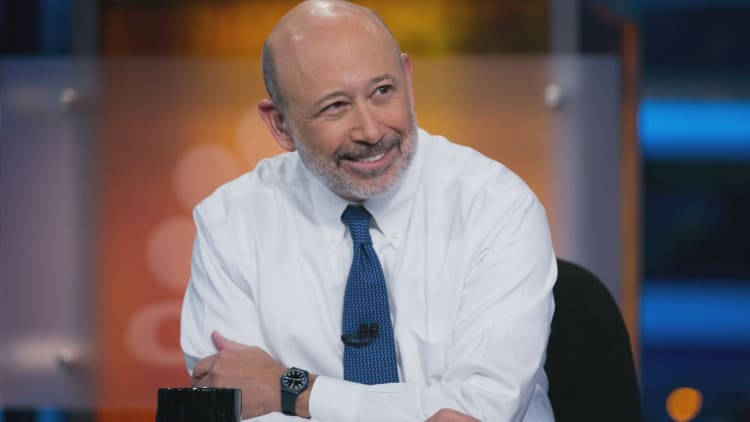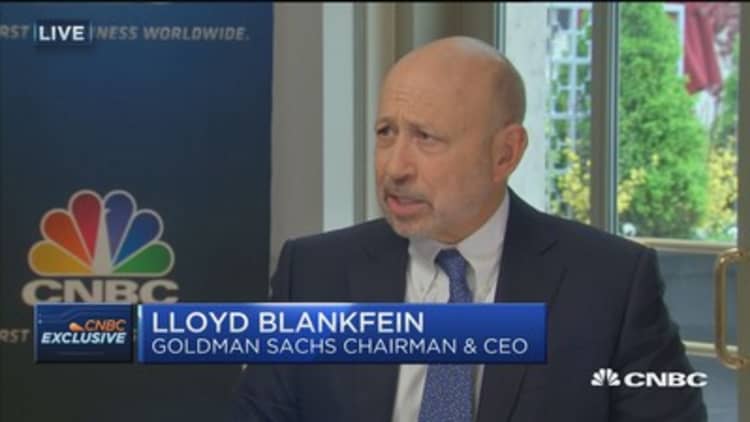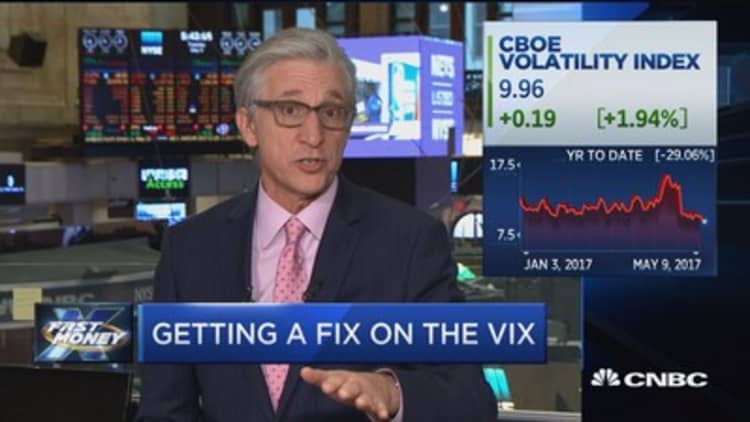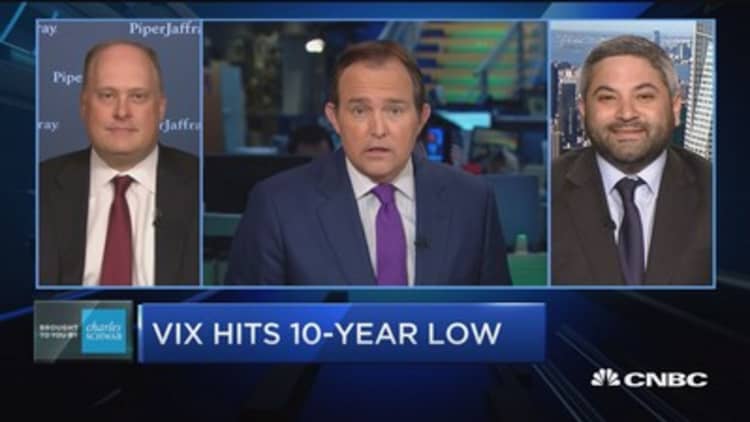
Volatility has basically evaporated across the financial markets, creating an eerie quiet that could be the calm before the storm.
The barometers that traders look at for stocks,
The lack of volatility, at least for stocks, suggests that there are few investors betting that the will make any big moves, not just for a month out but for months to come, according to market futures.
"It's not normal. That's for sure. We're having an extended period of time without a 1 percent move. I'm just amazed that with enough geopolitical stuff going on, people are so blasé about what's happening," said Art Cashin, director of floor operations at UBS.
What will jolt markets back to more normal moves is hard to say, but the volatility sank even lower after the French election.
"It usually doesn't end in a slow
"The black swans by their natures are unpredictable … the unknown unknowns," he said. "Something out there you're not talking about. Many of the other items on the horizon are well known — the Italian banks are a well-known challenge. The Brexit negotiation is something the market is anticipating."

Even Goldman Sachs CEO Lloyd Blankfein warned Tuesday that the low volatility is worrisome and that it is not a "normal resting state" for markets.
On Tuesday, stocks sold off just slightly after a report that North Korea's ambassador to the U.K. said the country would proceed with its sixth nuclear test. The S&P 500 closed off just 2 points at 2,396. Cashin said it is yet to be seen whether North Korea becomes an event that will return some volatility to the markets.
In the stock market, the the CBOE's Volatility Index, is trading at a decade low at just around 10. A measure of volatility for the euro is at its lowest level since 2014. In the bond market, rates are quiet and the low volatility is keeping a lid on activity. The volatility is low across markets, but it is lowest in U.S. stocks, experts said.
Arone said one reason for low volatility in equities is that the market is near all-time highs while rates are tame and monetary policy remains easy. He said there was a brief flurry from an inflation scare after the election, but that worry has gone away as oil prices have fallen.
"Earnings are phenomenal," he said. "Populism is waning." He said there was some positive movement forward on Trump's policies last week when the House approved the health-care bill, and it was
"The point is it's not one factor," said Ben Bowler, head of global equity derivatives research at Bank of America Merrill Lynch. "Everybody likes to point to one favorite factor. It's a multitude of factors that are all coming together.
"Most of the factors, I would argue, point back to a relatively sluggish growth environment where central banks still have a heavy hand in supporting markets overall. Some of these effects also have real feedback loops," Bowler said.
The eeriness of the calm in markets is striking after the initial flash of nervousness around the first round of the French election in April. Emmanuel Macron's victory on Sunday eased worries about a wave of far-right populism sweeping across Europe that would threaten the euro zone itself.
"Even when we saw the disruption in markets for Brexit and the election, the market was able to wash these events out of the matrix very quickly," said Dan Deming, managing director at KKM Financial. "Market participants are getting more and more conditioned to fade those moves."
Bowler also pointed to the quick spring-back in markets and noted the phenomena has been going on for the past two years. "This is an incredibly unusual

"The one thing that will really break us out of this funk is a shock in which the market initially buys the dip, and then you have a secondary shock that causes people to question whether this is the time when that trade breaks," Bowler said. "That will hit the reset button in terms of volatility."
Bowler said while the VIX only goes back to 1990, the realized volatility of the S&P would have been lower only 3 percent of the time going back to 1928. "It's very unusual statistically speaking. We've been setting records for volatility for quite some time," he said.
The VIX is perhaps the best-known volatility measure, and it reflects the implied movement in the S&P 500 based on trading
As for the VIX, it is signaling very shallow market moves. Deming said the near-term 10-day VIX, at 3.9 percent Tuesday, implies that the market was anticipating a quarter of a percent daily move in the S&P 500 on any given day over the next 10 days.
"We don't know the future. We know the past," Deming said. "Historically, the VIX does trade over realized volatility. There's always the risk of something happening in the future that's unknown.
"Given what we're seeing, the market is flatlining," he said. "That's why you're seeing the VIX trend lower. Even at
Analysts aren't expecting to necessarily see a pickup in volatility soon.
"This is May," said Robert Sinche, global strategist at Amherst Pierpont. "Summer's coming. If you think it's quiet now, what's going to happen over the summer? It's going to get even quieter. It's going to be a rough couple of months."
Watch: VIX hits 10-year low



